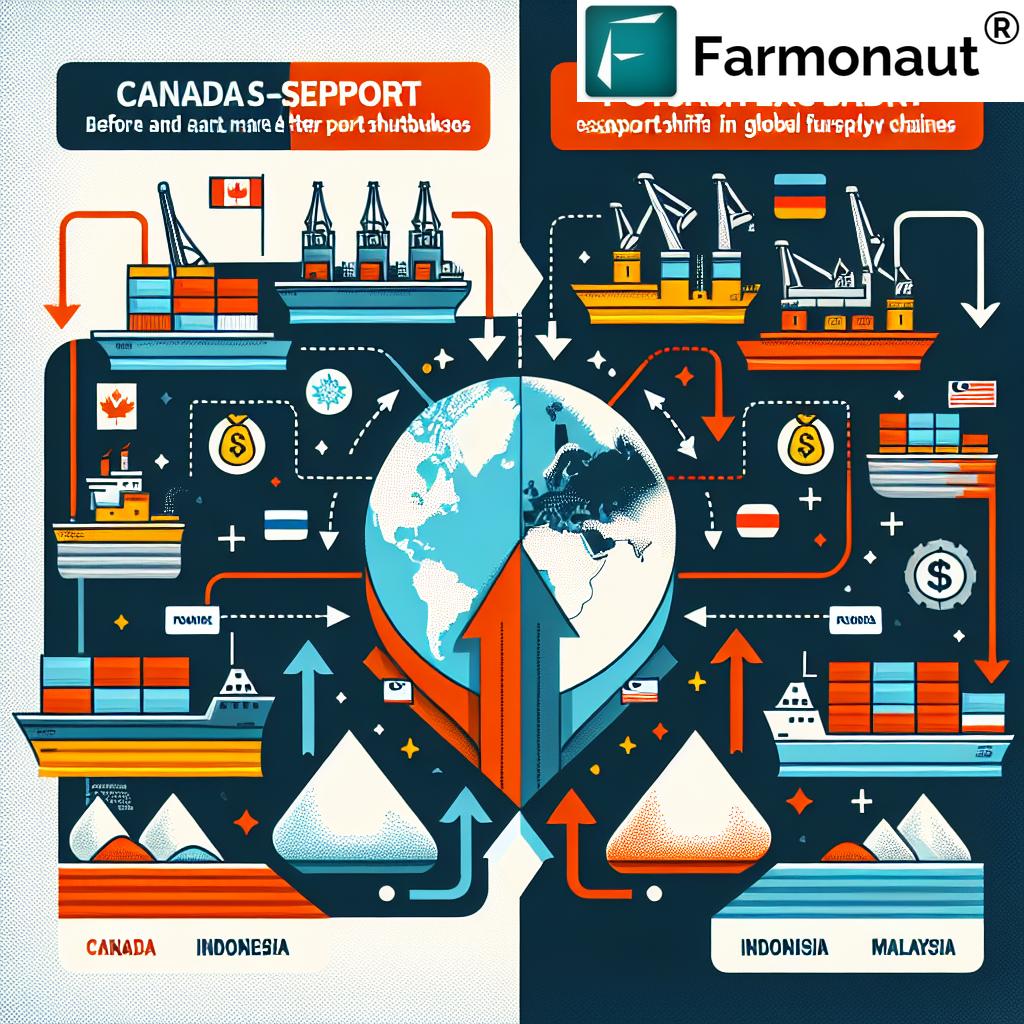Urgent: West Coast Port Stoppage Threatens Canada’s Potash Dominance and Global Food Security

In a critical development that has sent shockwaves through the potash fertilizer industry, a West Coast ports work stoppage that began on November 4, 2024, is threatening to disrupt Canada’s global potash export dominance and potentially impact global food security. Fertilizer Canada, the voice of Canada’s fertilizer industry, has sounded the alarm on the severe consequences of this ongoing labour dispute.
The Magnitude of the Crisis
The current port labour disputes have brought to light the vulnerability of fertilizer supply chains and the critical role that efficient port operations play in maintaining Canada’s position as a global leader in potash production and export. Here are the key facts:
- West Coast ports handle over 21,000 Mt of potash daily for export.
- Each day of the shutdown results in up to $9.7 million in lost sales revenue.
- Canada is responsible for nearly 40% of global potash production.
- 95% of Canada’s potash is exported to over 75 countries.
The ongoing Canada potash export disruption is not just a national concern but a global one, as it threatens to upset the delicate balance of international fertilizer supply and demand.
Impact on Global Food Security
The West Coast port stoppage impact extends far beyond Canada’s borders, posing a significant global food security threat. Potash, a crucial ingredient in fertilizers, plays a vital role in global agriculture:
- Fertilizers are responsible for half of the world’s current food production.
- Timely delivery is crucial, especially with the southern hemisphere’s spring planting season approaching.
- Disruptions in potash supply can lead to reduced crop yields and food shortages in importing countries.
Karen Proud, President and CEO of Fertilizer Canada, emphasizes the gravity of the situation: “Fertilizer is essential to food security, and this stoppage will have a devastating impact on Canada’s potash industry. Our overseas customers depend on us to deliver this crucial input.”

The Canadian Fertilizer Industry Crisis
The current work stoppage is just the latest in a series of challenges facing the Canadian fertilizer sector:
- The 2023 West Coast ports labour disruption cost the industry an estimated $126 million.
- It took 13 days to resolve and led to the curtailment of a potash mine.
- Cancellations of sales offers from international customers due to instability.
- Over the past six years, supply chain disruptions have cost the fertilizer industry nearly $1 billion in estimated lost sales revenue.
These recurring issues highlight the urgent need for long-term solutions to stabilize Canada’s supply chains and protect its position in the global fertilizer market.
Potash Supply Chain Disruption: A Domino Effect
The potash supply chain disruption caused by the port stoppage has far-reaching consequences:
- Potash production facilities have limited on-site storage capacity.
- If potash can’t move through the supply chain, it could lead to production curtailments.
- Disruptions at one point in the chain can cause ripple effects throughout the entire industry.
This situation underscores the importance of maintaining smooth operations at all points in the supply chain, from production facilities to export terminals.
Discover how Farmonaut’s satellite-based crop monitoring can help optimize fertilizer use and mitigate supply chain disruptions. 
Russia-Belarus Fertilizer Competition: A Growing Threat
The ongoing port stoppage isn’t just a domestic issue; it’s opening the door for increased Russia Belarus fertilizer competition. The consequences of this shift are significant:
- In the months following the 2023 disruption, Canada lost significant market share to Russia in key markets such as Indonesia and Malaysia.
- Competitors like Russia and Belarus operate with fewer environmental, safety, and ethical protections.
- A prolonged disruption could lead to a permanent shift in global potash supply chains, undermining Canada’s dominant position.
This situation highlights the delicate balance of the global fertilizer market and the importance of maintaining reliable supply chains to preserve market share and uphold environmental and ethical standards.
Canadian Port Labour Dispute Effects: Beyond Potash
The Canadian port labour dispute effects extend beyond the potash industry, impacting various sectors of the Canadian economy:
- The fertilizer industry contributes over $42 billion annually to Canada’s economy.
- It employs 100,400 workers throughout the supply chain.
- Ongoing labour disruptions at the Port of Montreal compound the issue, affecting multiple industries.
These widespread effects underscore the need for comprehensive solutions to port labour disputes that consider the broader economic implications.
Optimize your crop management with Farmonaut’s advanced API. Explore our API and developer documentation for seamless integration.
Call for Government Action
Fertilizer Canada is urging the federal government to take immediate action to resolve the work stoppage and prevent further damage to Canada’s economy and global reputation. Their proposals include:
- Amending the Canada Labour Code section 87.7 to ensure continuous movement of fertilizer products at ports during labour disputes.
- Implementing long-term solutions to stabilize Canada’s supply chains.
- Using all available tools to prevent further harm to Canada’s economy and reputation as a reliable trading partner.
Public support for these measures is strong, with polling showing that eight out of 10 Canadians support the uninterrupted shipment of products vital to domestic and global food security during work stoppages.
Looking Ahead: Securing Canada’s Fertilizer Future
As the crisis unfolds, it’s clear that swift and decisive action is needed to protect Canada’s position in the global potash market and ensure the stability of global food supply chains. The fertilizer industry, a cornerstone of Canada’s agri-food sector, is committed to finding innovative solutions that positively impact agriculture, the economy, and the social fabric of Canadian life.
However, without immediate intervention to resolve the port stoppage and implement long-term strategies to prevent future disruptions, Canada risks losing its competitive edge in the global fertilizer market. The stakes are high, not just for the Canadian economy, but for global food security as a whole.
Stay ahead of agricultural challenges with Farmonaut’s mobile apps:
As this situation continues to evolve, all eyes are on the Canadian government and port authorities to find a resolution that safeguards the nation’s crucial role in global fertilizer supply chains and upholds its commitment to global food security. The coming days and weeks will be critical in determining the future of Canada’s potash industry and its impact on world agriculture.















